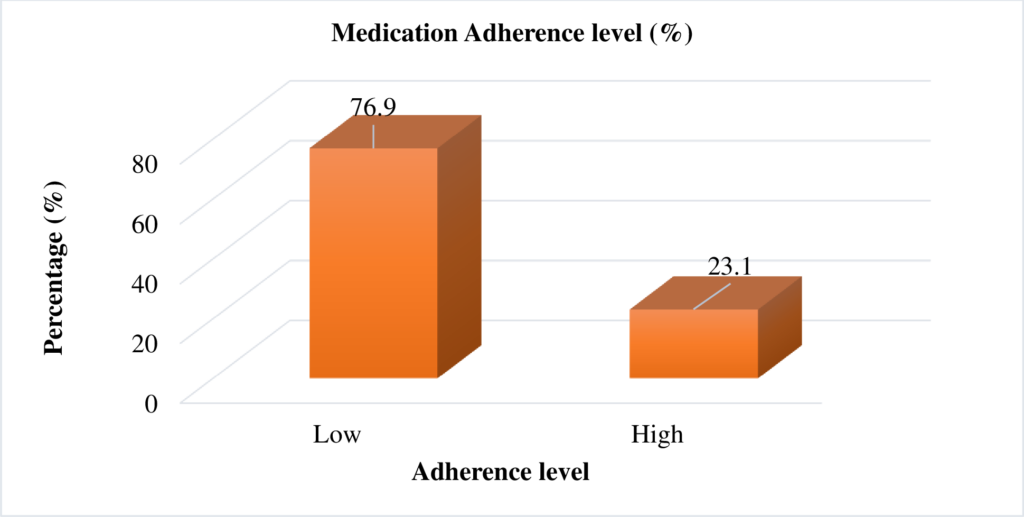Article Excerpt
Medication nonadherence in patients with chronic diseases, particularly in type 2 diabetes mellitus (T2DM) with comorbidity, has continued to be the cause of treatment failure. The current study assessed medication adherence and its impact on glycemic control in T2DM patients with comorbidity.
A total of 403 samples were included in the final study. This study showed that more than three-fourths (76.9%) of the participants were under a low level of medication adherence. Source of medication cost coverage [AOR = 10.593, 95% CI (2.628–41.835; P = 0.003], monthly income (P < 0.00), self-monitoring of blood glucose (SMBG) practice [AOR = 0.266, 95% CI (0.117–0.604); P = 0.002], number of medications [AOR = 0.068, 95% CI (0.004–0.813); P = 0.014] and medical conditions [AOR = 0.307, 95% CI (0.026–0.437); P = 0.018] were found to be significant predictors of medication adherence. Significantly, majority (74.7%) of participants had poor levels of glycemic control. Patients who had a high level of medication adherence [AOR = 0.003, 95% CI (0.000–0.113); P = 0.002] were found less likely to have poor glycemic control compared with patients who were low adherent to their medications.
In this study, most of the participants were found to have a low level of medication adherence. This finding is consistent with an earlier study [38], but it is much higher than the other studies [14, 18, 36, 39–41]. The study findings indicate that a significant proportion of patients with comorbidity fail to achieve the expected adherence level of medications. This might be because patients may discontinue medications due to other medications for additional diseases and or it might be difficult to remember medications due to medication regimen complexity. The current study also disclosed that around two-thirds of the participants responded that they discontinued medications either sometimes or mostly because of other medicines for additional problems and difficulty in remembering because of medication complexity. The other possibilities for their lower medication adherence are the patients’ fear of medication adverse effects, medication expensiveness and poor patients’ behavior towards their medication. Thus, the finding has implications, which need to be focus towards improving the medication adherence of T2DM patients with comorbidity. In addition, particularly in Ethiopia, the problem might be related to a low level of patients’ knowledge about the diabetes, their medications and low socio-economic status, literacy status, cultural and personal perceptions as well as healthcare factors. The previous study also showed that personal beliefs and literacy status have a significant association with medication adherence in patients with chronic illness. Therefore, in Ethiopian settings and population, personal beliefs and literacy status could be addressed in the prescription of medications.
The current study concluded that medication adherence was low and significantly associated with glycemic control of patients. Medication cost coverage, monthly income, SMBG practice, number of medications and medical conditions were found to have significant association with medication adherence. On the other hand, glycemic control was found to have a significant association with SMBG practice, level of BMI and level of medication adherence. Therefore, management interventions of T2DM patients with comorbidity should focus on improving medication adherence and other predictor variables.

Relevance
This article highlights one of the largest issues surrounding diabetes in general which is medication adherence. Due to the fact that any type of diabetes requires constant monitoring and medication, there is a lot of room for missing treatment or neglecting treatment. These issues may come about from many different avenues, as highlighted in the article. The future of diabetes management needs to include better ways to control the adherence to medication.
If patients are not getting the medication their bodies need to regulate themselves, this can lead to many larger health complications that could be much more costly. Creating a autonomous system or system that allows for less missed medication would be a great step in the right direction. A form of treatment that does not require constant thought and upkeep from the patient would help eliminate stress about forgetting or missing your medication. However, it is still important for the patient, no matter the condition, to be constantly monitoring themselves and keeping good care of their bodies.
Sources
Day, A. (2023, June 20). The best pill boxes. The New York Times. https://www.nytimes.com/wirecutter/reviews/best-pill-boxes/
Sendekie, A. K., Netere, A. K., Kasahun, A. E., & Belachew, E. A. (2022, September 21). Medication adherence and its impact on glycemic control in type 2 diabetes mellitus patients with comorbidity: A Multicenter cross-sectional study in northwest Ethiopia. PLOS ONE. https://journals.plos.org/plosone/article?id=10.1371%2Fjournal.pone.0274971




